
In the field of science different researchers may assign different meanings for the team research approach. In some publications you may see that research approach may imply methods of data collection and data analysis in general and differences between qualitative and quantitative methods in particular. However, in our view research approach is best seen as a general plan and procedure for conducting the study. Accordingly, approach for the research can be divided into three categories: Deductive approach Inductive approach Abductive approach The relevance of hypotheses to the study is the main distinctive point between deductive and inductive approaches. Deductive approach tests the validity of assumptions (or theories/hypotheses) in hand, whereas inductive approach contributes to the emergence of new theories and generalizations. Abductive research, on the other hand, starts with ‘surprising facts’ or ‘puzzles’ and the research process is devoted their explanation.[1] The following table illustrates the major differences between deductive, inductive and abductive research approaches in terms of logic, generaliability, use of data and theory.[2] Deduction Induction Abduction Logic In a deductive inference, when the premises are true, the conclusion must also be true In an inductive inference, known premises are used to generate untested conclusions In an abductive inference, known premises are used to generate testable conclusions Generalizability Generalising from the general to the specific Generalising from the specific to the general Generalising from the interactions between the specific and the general Use of data Data collection is used to evaluate propositions or hypotheses related to an existing theory Data collection is used to explore a phenomenon, identify themes and patterns and create a conceptual framework Data collection is used to explore a phenomenon, identify themes and patterns, locate these in a conceptual framework and test this through subsequent data collection and so forth Theory …
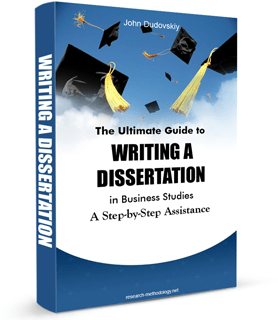
Business research methods can be defined as “a systematic and scientific procedure of data collection, compilation, analysis, interpretation, and implication pertaining to any business problem”[1]. Types of research methods can be classified into several categories according to nature and purpose of the study, methods of data collection, type of data, research design and other attributes. In methodology chapter of your dissertation, you need to specify and discuss the type of your research according to the following classifications. Types of Research Methods According to Nature of the Study Types of the research methods according to the nature of research can be divided into two groups: descriptive and analytical. Descriptive research usually involves surveys and studies that aim to identify the facts. In other words, descriptive research mainly deals with the “description of the state of affairs as it is at present”[2], and there is no control over variables in descriptive research. Analytical research, on the other hand, is fundamentally different in a way that “the researcher has to use facts or information already available and analyse these in order to make a critical evaluation of the material”.[3] Types of Research Methods According to the Purpose of the Study According to the purpose of the study, types of research methods can be divided into two categories: applied research and fundamental research. Applied research is also referred to as action research, and the fundamental research is sometimes called basic or pure research. The Table 1 below summarizes the main differences between applied research and fundamental research.[4] Similarities between applied and fundamental (basic) research relate to the adoption of a systematic and scientific procedure to conduct the study.[5] Fundamental Research Applied Research § Tries to eliminate the theory by adding to the basics of a discipline § Problems are analysed from the point…
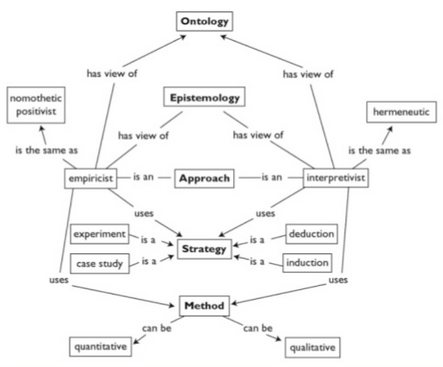
Ontology and epistemology are two different ways of viewing the research philosophy. Ontology in business research can be defined as “the science or study of being”[1] and it deals with the nature of reality. Ontology is a system of belief that reflects an interpretation of an individual about what constitutes a fact. In simple terms, ontology is associated with what we consider as reality. Table 1 below illustrates main questions that key philosophical concepts attempt to answer: Philosophical concept Main question Ontology What is the nature of reality? Epistemology What can be accepted as knowledge? Methodology How knowledge regarding given question can be produced? Methods What specific ways of data collection and data analysis can be used? Paradigm What are the conceptual and/or methodological models that relate to a specific discipline during a particular period of time? Table 1 Key philosophical concepts and questions Ontology relates to a central question of whether social entities need to be perceived as objective or subjective. In other words, within the scope of your research you need to decide whether the world is external to social world or the perceptions and actions of social actors create social phenomena.[2] Accordingly, objectivism (or positivism) and subjectivism can be specified as two important aspects of ontology. Objectivism “portrays the position that social entities exist in reality external to social actors concerned with their existence”[3]. Alternatively, objectivism “is an ontological position that asserts that social phenomena and their meanings have an existence that is independent of social actors”[4]. Subjectivism (also known as constructionism or interpretivism) on the contrary, perceives that social phenomena are created from perceptions and consequent actions of those social actors concerned with their existence. Formally, constructionism can be defined as “ontological position which asserts that social phenomena and their meanings are continually being accomplished by social…
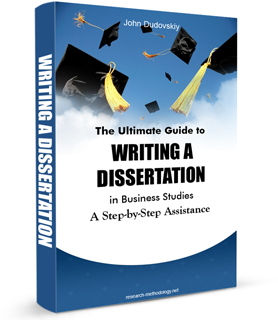
Phenomenology in business research focuses on experiences, events and occurrences with disregard or minimum regard for the external and physical reality. Phenomenology, also known as non-positivism, is a variation of interpretivism, along with other variations such as hermeneutics, symbolic interactionism and others. In simple terms, phenomenology can be explained as the science of mindful experience. It focuses on meanings of phenomena. This branch of philosophy “describes the philosophical approach that what is directly perceived and felt is considered more reliable than explanations or interpretations in communication”.[1] In phenomenology ideas are generated from rich amount of data by the means of induction and human interests, as well as stakeholder perspective may have their reflection on the study. Moreover, phenomenology in business studies is a valuable philosophy for exploring human experiences in management studies. A study analysing the impact of leadership style on employee motivation through conducting in-depth interviews with employees is a suitable example for research with a phenomenology philosophy. Furthermore, a study into work-life balance and its impact on employee performance is another example for phenomenology research in business because such a study needs to describe the experience of sample group members. Phenomenological studies can be divided into three categories: Transcendental phenomenology. The scientific study of appearance of things as they are seen and appear on one’s consciousness. Hermeneutic phenomenology. Focus on making meaning of experiences as they are lived. Existential phenomenology. Attempting to understand experiences of an individual from the consciousness of those having the experience. Advantages and Disadvantages of Phenomenology Advantages associated with phenomenology include better understanding of meanings attached by people and its contribution to the development of new theories. Its disadvantages include difficulties with analysis and interpretation, usually lower levels of validity and reliability compared to positivism, and more time and other resources required for data collection. The main advantages…

It has to be acknowledged that it is difficult to explain positivism research philosophy in a precise and succinct manner. This is because there are vast differences between settings in which positivism is used by researchers. The number variations in explaining positivism may be equal to the number of authors who addressed the area of research philosophy. Nevertheless, in its essence, positivism is based on the idea that science is the only way to learn about the truth. The text below explains positivism research philosophy with the focus on business studies in particular. Positivism: Introduction As a philosophy, positivism adheres to the view that only “factual” knowledge gained through observation (the senses), including measurement, is trustworthy. In positivism studies the role of the researcher is limited to data collection and interpretation in an objective way. In other words, the researcher is an objective analyst and she distances herself from personal values in conducting the study. In these types of studies research findings are usually observable and quantifiable. Positivism depends on quantifiable observations that lead to statistical analyses. It has been a dominant form of research in business and management disciplines for decades. It has been noted that “as a philosophy, positivism is in accordance with the empiricist view that knowledge stems from human experience. It has an atomistic, ontological view of the world as comprising discrete, observable elements and events that interact in an observable, determined and regular manner”[1]. Moreover, in positivism studies the researcher is independent form the study and there are no provisions for human interests within the study. Crowther and Lancaster (2008)[2] argue that as a general rule, positivist studies usually adopt deductive approach, whereas inductive research approach is usually associated with a phenomenology philosophy. Moreover, positivism relates to the viewpoint that researcher needs to concentrate on facts, whereas phenomenology concentrates on the meaning and has provision for…
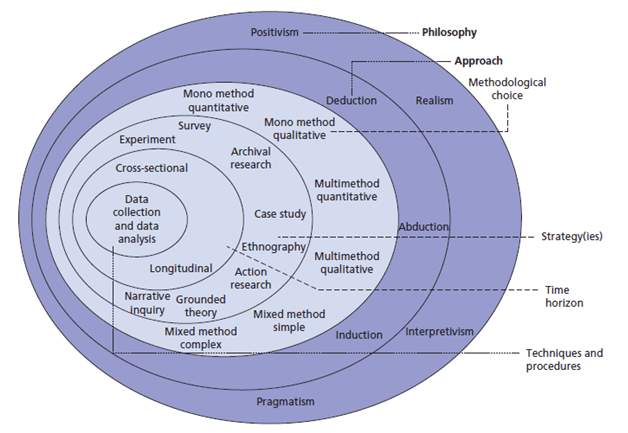
Research philosophy is a vast topic and here we will not be discussing this topic in great details. Research philosophy is associated with assumption, knowledge and nature of the study. It deals with the specific way of developing knowledge. This matter needs to be addressed because researchers may have different assumptions about the nature of truth and knowledge and philosophy helps us to understand their assumptions. In business and economics dissertations at Bachelor’s level, you are not expected to discuss research philosophy in a great level of depth, and about one page in methodology chapter devoted to research philosophy usually suffices. For a business dissertation at Master’s level, on the other hand, you may need to provide more discussion of the philosophy of your study. But even there, about two pages of discussions are usually accepted as sufficient by supervisors. Discussion of research philosophy in your dissertation should include the following: You need to specify the research philosophy of your study. Your research philosophy can be pragmatism, positivism, realism or interpretivism as discussed below in more details. The reasons behind philosophical classifications of the study need to be provided. You need to discuss the implications of your research philosophy on the research strategy in general and the choice of primary data collection methods in particular. The Essence of Research Philosophy Research philosophy deals with the source, nature and development of knowledge[1]. In simple terms, research philosophy is belief about the ways in which data about a phenomenon should be collected, analysed and used. Although the idea of knowledge creation may appear to be profound, you are engaged in knowledge creation as part of completing your dissertation. You will collect secondary and primary data and engage in data analysis to answer the research question and this answer marks the creation of…
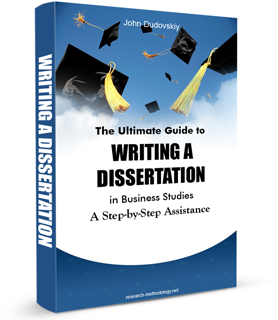
Axiology is a branch of philosophy that studies judgements about the value[1]. The term axiology is derived from the Greek and means ‘value’ or ‘worth’. Axiology is engaged with assessment of the role of researcher’s own value on all stages of the research process.[2]. It is a relatively recent addition to the area of research philosophy. Axiology primarily refers to the ‘aims’ of the research. This branch of the research philosophy attempts to clarify if you are trying to explain or predict the world, or are you only seeking to understand it.[3] In simple terms, axiology focuses on what do you value in your research. This is important because your values affect how you conduct your research and what do you value in your research findings. The table below illustraties the axiology of major research philosopies and highlights relevant methods of data collection. Axiology Popular data collection techniques Positivism Research is undertaken in a value-free way, the researcher is independent from the data and maintains an objective stance Highly structured, large samples, measurement, quantitative can also use qualitative Realism Research is value laden; the researcher is biased by world views, cultural experiences and upbringings. These effect research findings Methods chosen must fit the subject matter, quantitative or qualitative Interpretivism Research is value bound, the researcher is part of what is being researched, cannot be separated and so will be subjective Small samples, in-depth investigations, qualitative Pragmatism Values play a large role in interpreting results, the researcher adopting both objective and subjective points of view Mixed or multiple method designs, quantitative and qualitative Axiology of research philosophies and relevant data collection techniques[4] In your dissertation, you can add a paragraph or two discussing the relevance of axiology in your research. For example, you have chosen positivism research positivism research philosophy, you…

Dissertation markers expect you to include the explanation of research process in methodology chapter. A typical research process comprises the following stages: 1. Selecting the research area. Your dissertation marker expects you to state that you have selected the research area due to professional and personal interests in the area and this statement must be true. Students often underestimate the importance of this first stage in the research process. If you find a research area and research problem that is genuinely interesting to you it is for sure that the whole process of writing your dissertation will be much easier. Therefore, it is never too early to start thinking about the research area for your dissertation. 2. Formulating research aim, objectives and research questions or developing hypotheses. The choice between the formulation of research questions and the development of hypotheses depends on your research approach as it is discussed further below in more details. Appropriate research aims and objectives or hypotheses usually result from several attempts and revisions. Accordingly, you need to mention in your dissertation that you have revised your research aims and objectives or hypotheses during the research process several times to get their final versions. It is critically important that you get confirmation from your supervisor regarding your research questions or hypotheses before moving forward with the work. 3. Conducting the literature review. Literature review is usually the longest stage in the research process. Actually, the literature review starts even before the formulation of research aims and objective. This is because you have to check if exactly the same research problem has been addressed before and this task is a part of the literature review. Nevertheless, you will conduct the main part of the literature review after the formulation of research aim and objectives. You have to…

Sources for literature review can be divided into three categories as illustrated in table below. In your dissertation you will need to use all three categories of literature review sources: Sources of literature Characteristics Examples Primary sources for the literature High level of detail Little time needed to publish Reports Theses Emails Conference proceedings Company reports Unpublished manuscript sources Some government publications Secondary sources for the literature Medium level of detail Medium time needed to publish Journals Books Newspapers Some government publications Articles by professional associations Tertiary sources for the literature Low level of detail Considereable amount of time needed to publish Indexes Databases Catalogues Encyclopaedias Dictionaries Bibliographies Citation indexes Statistical data from government websites Sources for literature review and examples Generally, your literature review should integrate a wide range of sources such as: Books. Textbooks remain as the most important source to find models and theories related to the research area. Research the most respected authorities in your selected research area and find the latest editions of books authored by them. For example, in the area of marketing the most notable authors include Philip Kotler, Seth Godin, Malcolm Gladwell, Emanuel Rosen and others. Magazines. Industry-specific magazines are usually rich in scholarly articles and they can be effective source to learn about the latest trends and developments in the research area. Reading industry magazines can be the most enjoyable part of the literature review, assuming that your selected research area represents an area of your personal and professional interests, which should be the case anyways. Newspapers can be referred to as the main source of up-to-date news about the latest events related to the research area. However, the proportion of the use of newspapers in literature review is recommended to be less compared to alternative sources…

Sometimes you are required to explain your literature search strategy used in your research. Even when you are not officially required to do so, including the explanation of literature search strategy in the literature review chapter is going to boost your marks considerably. Keeping a literature search diary to write your search activities is a good way of keeping track of your literature review progress. The diary can be in the paper format, a Microsoft Word file or an Excel spreadsheet and include the following Names of sources Search terms used The numbers of search results generated from each source. Generally, you can conduct your literature search strategy in the following stages: 1. Identification of search terms. For example, for a study entitled “An investigation into the impacts of management practices on the levels of employee motivation at Coca-Cola USA” search terms can be specified as management, management style, motivation, employee morale, leadership, satisfaction, work-life balance, and others. Your search strategy for the relevant literature should also consider synonyms of key words. For example above, the search term of employee motivation might be referred to elsewhere as employee morale or employee willingness. 2. Finding an initial pool of online and offline resources according to the search term. Equipped with search terms, a vast pool of relevant literature can be generated from a wide range of sources. The most effective secondary data sources include the following: Bibliographic databases such as Emerald and Google Scholar Online libraries such as Questia Conference proceedings Key industry journals and magazines 3. Filtering the literature according to credentials of authors. Due to the word limits imposed for the literature review chapter, as well as, other chapters of the dissertation, it is not possible, nor desirable to discuss all of the sources you have…
